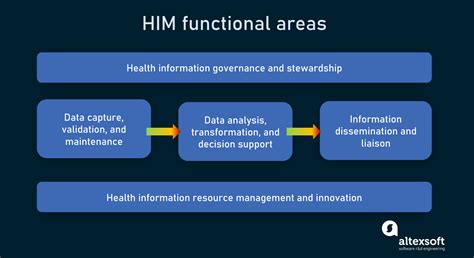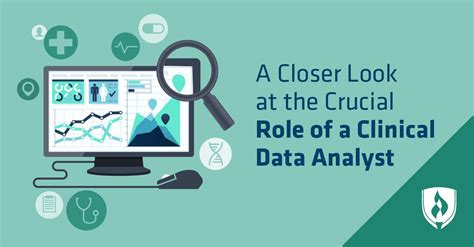Intro
Discover the exciting world of Health Information Management (HIM) with our guide to 5 in-demand career paths. Learn about roles in Clinical Coding, Health Data Analysis, HIM Consulting, Medical Records Management, and Health Informatics, and explore the skills and certifications needed to succeed in this rapidly growing field.
The healthcare industry is rapidly evolving, and the need for skilled professionals in health information management (HIM) has never been more pressing. With the increasing demand for high-quality patient care and the growing importance of data-driven decision-making, HIM professionals play a critical role in ensuring the accuracy, security, and accessibility of healthcare data. In this article, we will explore five career paths in health information management that are in high demand and offer a promising future for those interested in this field.

Understanding Health Information Management
Health information management is the practice of collecting, analyzing, and protecting patient data to ensure that it is accurate, complete, and accessible to healthcare providers. HIM professionals work in a variety of settings, including hospitals, clinics, and private practices, to manage the flow of information and ensure that it is used effectively to improve patient outcomes.
Key Responsibilities of HIM Professionals
- Collecting and analyzing patient data
- Ensuring the accuracy and completeness of patient records
- Developing and implementing policies and procedures for data management
- Ensuring compliance with regulatory requirements, such as HIPAA
- Providing training and support to healthcare providers on data management best practices
Career Path 1: Health Information Manager
Health information managers are responsible for overseeing the collection, analysis, and dissemination of patient data. They work closely with healthcare providers to ensure that data is accurate, complete, and accessible, and that it is used effectively to improve patient outcomes.

- Median salary: $119,840 per year (according to the Bureau of Labor Statistics)
- Education: Bachelor's degree in health information management or a related field
- Skills: Analytical and problem-solving skills, attention to detail, excellent communication skills
Career Path 2: Clinical Data Analyst
Clinical data analysts work with healthcare providers to analyze patient data and identify trends and patterns that can inform treatment decisions. They use statistical software and programming languages, such as R and Python, to analyze large datasets and develop reports and visualizations to communicate findings.

- Median salary: $83,610 per year (according to the Bureau of Labor Statistics)
- Education: Bachelor's degree in health information management or a related field
- Skills: Statistical analysis and programming skills, attention to detail, excellent communication skills
Career Path 3: Health Information Technician
Health information technicians are responsible for collecting and analyzing patient data, as well as ensuring that it is accurate and complete. They work closely with healthcare providers to identify and resolve data discrepancies, and to ensure that data is used effectively to improve patient outcomes.

- Median salary: $42,820 per year (according to the Bureau of Labor Statistics)
- Education: Associate's degree in health information technology or a related field
- Skills: Analytical and problem-solving skills, attention to detail, excellent communication skills
Career Path 4: Medical Records Specialist
Medical records specialists are responsible for managing patient records, including collecting, analyzing, and disseminating data. They work closely with healthcare providers to ensure that records are accurate, complete, and accessible, and that they are used effectively to improve patient outcomes.

- Median salary: $44,090 per year (according to the Bureau of Labor Statistics)
- Education: Associate's degree in health information technology or a related field
- Skills: Analytical and problem-solving skills, attention to detail, excellent communication skills
Career Path 5: Health Informatics Specialist
Health informatics specialists work with healthcare providers to design and implement electronic health record systems, as well as other health information systems. They use their knowledge of healthcare and technology to ensure that systems are user-friendly, efficient, and effective.

- Median salary: $93,440 per year (according to the Bureau of Labor Statistics)
- Education: Bachelor's degree in health informatics or a related field
- Skills: Technical skills, including programming and software development, as well as excellent communication skills
In conclusion, health information management is a rapidly growing field with a wide range of career paths available. Whether you are interested in working as a health information manager, clinical data analyst, health information technician, medical records specialist, or health informatics specialist, there are many opportunities to make a difference in the healthcare industry.
We invite you to share your thoughts and experiences in the field of health information management. How do you see the field evolving in the coming years? What skills and education do you think are most important for success in HIM? Share your comments below!
What is health information management?
+Health information management is the practice of collecting, analyzing, and protecting patient data to ensure that it is accurate, complete, and accessible to healthcare providers.
What are the key responsibilities of HIM professionals?
+HIM professionals are responsible for collecting and analyzing patient data, ensuring the accuracy and completeness of patient records, developing and implementing policies and procedures for data management, ensuring compliance with regulatory requirements, and providing training and support to healthcare providers on data management best practices.
What skills are required for success in HIM?
+HIM professionals require analytical and problem-solving skills, attention to detail, excellent communication skills, and technical skills, including programming and software development.
